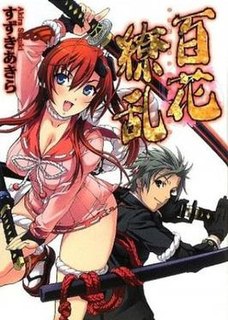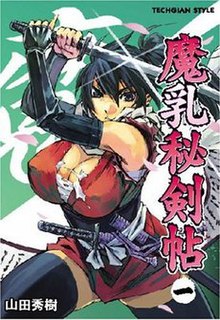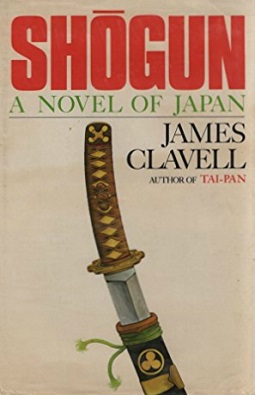 W
WThe Ambition of Oda Nobuna is a Japanese light novel series written by Mikage Kasuga and illustrated by Miyama-Zero. It was adapted into an anime television series animated by Madhouse and Studio Gokumi that aired from July 9, 2012, to September 24, 2012. Sentai Filmworks licensed the series in 2014 and released the series on December 16, 2014, along with an English dub.
 W
WAzumi 2: Death or Love is a Japanese jidaigeki film written by Mataichiro Yamamoto and Yoshiaki Kawajiri, directed by Shusuke Kaneko, and starring Aya Ueto, Yuma Ishigaki, Chiaki Kuriyama and Shun Oguri. It is sequel to the Japanese film Azumi based on the manga series of the same title by Yū Koyama.
 W
WBattle Girls: Time Paradox, known in Japan as Sengoku Otome: Momoiro Paradox , is a 2011 Japanese anime television series based on the CR Sengoku Otome pachinko game series developed by Heiwa. Produced by TMS Entertainment under the direction of Hideki Okamoto, the anime series aired on TV Tokyo between April 4, 2011 and June 27, 2011. The series has been licensed in North America by Sentai Filmworks. A video game based on the series, Sengoku Otome: Battle Legends, was released for PlayStation Vita on August 25, 2016.
 W
WBlack Cat Mansion is a 1958 Japanese horror film directed by Nobuo Nakagawa. The film is presented in a nonlinear narrative, taking place in the characters' present and past, and in the distant past. The film was not dubbed in English, nor was it shown theatrically in the United States.
 W
WG.I. Samurai is a 1979 Japanese science fiction/action film focusing on the adventures of a modern-day Japan Ground Self-Defense Force (JGSDF) and Japan Maritime Self-Defense Force (JMSDF) team that accidentally travels in time to the Warring States period . The film stars Sonny Chiba, one of the top male Japanese actors, and was based on a novel by Ryo Hanmura, a well-known writer of historical novels and science fiction. A remake was theatrically released in Japan in 2005 under the title Samurai Commando: Mission 1549.
 W
WGoemon is a 2009 Japanese historical fantasy film written and directed by Kazuaki Kiriya. It is loosely based on the story of Ishikawa Goemon, a legendary outlaw hero who stole valuables from the rich and gave them to the poor. The film is a fictional account of Goemon's exploits and his role during the final phase of Sengoku period, particularly the period leading up to the decisive Battle of Sekigahara. Like Kiriya's previous film, Casshern, Goemon was filmed on a digital backlot, and made use of over 2,500 visual effects.
 W
WHyakka Ryōran: Samurai Girls is a light novel series written by Akira Suzuki with illustrations by Niθ to commemorate Hobby Japan's 40th anniversary. The first volume was released by Hobby Japan on February 28, 2009, with 17 volumes currently available in Japan under their HJ Bunko imprint. There are currently three different manga adaptations based on the Hyakka Ryoran universe published. An online anthology comic was serialized on Hobby Japan's media website Hobby Channel from June 1, 2010, and sold two volumes as of June 2011; a manga adaptation illustrated by Junichi Iwasaki began serialization in the November 2010 issue of Monthly Comic Alive; and another manga adaptation by Tatara Yano began serialization in Hobby Japan's online manga magazine Comic Dangan on December 23, 2011. A spinoff manga called Hyakka Ryōran: Sengoku Maidens, illustrated by Yuri Shinano, was serialized in the March 2009 issue of Dengeki Daioh and ended in the March 2011 issue, and released three volumes as of March 2012.
 W
WInuyasha , also known as Inuyasha: A Feudal Fairy Tale , is a Japanese manga series written and illustrated by Rumiko Takahashi. The series begins with Kagome Higurashi, a fifteen-year-old middle school girl from modern-day Tokyo who is transported to the Japanese era of Sengoku period after falling into a well in her family shrine, where she meets the half-dog demon, half-human Inuyasha. When a centipede demon from the ancient era tries to take the sacred Shikon Jewel that re-emerges from deep inside Kagome's body, she inadvertently shatters the Jewel into dozens of fragments that are scattered across Japan. Inuyasha and Kagome set to recover the Jewel's fragments, and through their quest they are joined by the lecherous monk Miroku, the demon slayer Sango, and the fox demon Shippo. Together, they journey to restore the Shikon Jewel before it falls into the hands of the evil half-demon Naraku.
 W
WKagemusha is a 1980 jidaigeki film directed by Akira Kurosawa. Kagemusha is the Japanese term for a political decoy, literally meaning "shadow warrior". It is set in the Sengoku period of Japanese history and tells the story of a lower-class criminal who is taught to impersonate a dying daimyō to dissuade opposing lords from attacking the newly vulnerable clan. The daimyō is based on Takeda Shingen, and the film ends with the climactic 1575 Battle of Nagashino.
 W
WKamen Rider Gaim is a Japanese television series, a tokusatsu drama that is in the Kamen Rider Series; it is the 15th series during its Heisei run and 24th overall. The series, written by Gen Urobuchi, directed by Ryuta Tasaki and produced by Naomi Takebe, began airing on TV Asahi from October 6, 2013, replacing Kamen Rider Wizard in its initial timeslot and joining Zyuden Sentai Kyoryuger then Ressha Sentai ToQger in the Super Hero Time programming block, until Gaim concluded on September 28, 2014.
 W
WKarasu Tengu Kabuto is a manga and anime series, created by Buichi Terasawa in 1987.
 W
WManyū Hiken-chō is a Japanese manga series written and illustrated by Hideki Yamada. Set in a parallel version of the Taihei Edo period, the series follows the busty kunoichi, Chifusa. The manga began serialization in Enterbrain's seinen manga magazine Tech Gian in 2005. An anime adaptation produced by Hoods Entertainment aired in Japan from July to September 2011.
 W
WPrincess Mononoke is a 1997 Japanese-animated epic fantasy film written and directed by Hayao Miyazaki, animated by Studio Ghibli for Tokuma Shoten, Nippon Television Network and Dentsu, and distributed by Toho. The film stars the voices of Yōji Matsuda, Yuriko Ishida, Yūko Tanaka, Kaoru Kobayashi, Masahiko Nishimura, Tsunehiko Kamijo, Akihiro Miwa, Mitsuko Mori and Hisaya Morishige.
 W
WRan is a 1985 epic war drama film directed, edited and co-written by Akira Kurosawa. The plot derives from William Shakespeare's King Lear and includes segments based on legends of the daimyō Mōri Motonari. The film stars Tatsuya Nakadai as Hidetora Ichimonji, an aging Sengoku-period warlord who decides to abdicate as ruler in favor of his three sons.
 W
WSamurai Champloo , stylized as SAMURAI CHAMPLOO, is a Japanese anime series developed by Manglobe. It featured a production team led by director Shinichirō Watanabe, character designer Kazuto Nakazawa and mechanical designer Mahiro Maeda. Samurai Champloo was Watanabe's first directorial effort for an anime television series after the critically acclaimed Cowboy Bebop. It was first broadcast in Japan on Fuji TV on May 20, 2004, and ran for twenty-six episodes until its conclusion on March 19, 2005.
 W
WSamurai Warriors is the first title in the series of hack and slash video games created by Koei's Omega Force team based closely around the Sengoku period of Japanese history and it is a sister series of the Dynasty Warriors series, released for the PlayStation 2 and Xbox in 2004. A port of this game called Samurai Warriors: State of War has been released for the PlayStation Portable, which includes additional multiplayer features.
 W
WSengoku Basara: End of Judgement is an anime television series based on the Sengoku Basara games originally created by CAPCOM. It began airing on July 6, 2014 on NTV and tells its own version of the story from the video game Sengoku Basara: Samurai Heroes.
 W
WSengoku Basara: Samurai Kings is a Japanese anime television series based on the Capcom video game series of the same name made by Production I.G, planned and written by Yasuyuki Muto, and chiefly directed by Itsuro Kawasaki. The series started broadcast on Japan's Chubu-Nippon Broadcasting (CBC) station in April 2009; other networks broadcast the episodes within a few days, including TBS, MBS, and Animax. Its first season made its North American television debut on the Funimation Channel on November 16, 2010.
 W
WSengoku Basara: The Last Party is an anime film that portrays the end of the Sengoku period. It is the finale to an anime series known as Sengoku Basara: Samurai Kings. The film was released in Japanese theaters on June 4, 2011. Kazuya Nakai, Sōichirō Hoshi, Tōru Ōkawa, Tomokazu Seki, Masakazu Morita, Toshiyuki Morikawa, Takehito Koyasu, Norio Wakamoto, and Mamiko Noto reprise their roles from the Samurai Kings series with Fumihiko Tachiki, Show Hayami, and Jun Fukuyama co-starring as those who first appeared in Sengoku Basara: Samurai Heroes.
 W
WSengoku Collection is a mobile social networking game created by Konami, which was launched for the Mobage service in December 2010. The series features female representations of feudal lords from the Sengoku period. An anime television series produced by Brain's Base based on the game aired on TV Tokyo between April 5, 2012 and September 27, 2012.
 W
WSengoku Jieitai Sekigahara No Tatakai is a 2006 television series mainly based on the Sengoku Jieitai movie in 1979 and the 2005 movie Sengoku Jieitai 1549. Its director, Kōsei Saitō, had been involved in the creation of the Sengoku Jietai 1979 movie.
 W
WSeven Samurai is a 1954 Japanese epic samurai drama film co-written, edited, and directed by Akira Kurosawa. The story takes place in 1586 during the Sengoku period of Japanese history. It follows the story of a village of farmers that hire seven rōnin to combat bandits who will return after the harvest to steal their crops.
 W
WShinobi no Mono (忍びの者) is a series of jidaigeki novels written by Tomoyoshi Murayama originally serialized in the Sunday edition of the newspaper Akahata from November 1960 to May 1962. Shinobi no mono is the long form of the phrase meaning ninja, see the Ninja article for details.
 W
WShōgun is a 1975 novel by James Clavell. It is the first novel of the author's Asian Saga. A major best-seller, by 1990 the book had sold 15 million copies worldwide. Beginning in feudal Japan some months before the critical Battle of Sekigahara in 1600, Shōgun gives an account of the rise of the daimyō "Toranaga". Toranaga's rise to the shogunate is seen through the eyes of the English sailor John Blackthorne, called Anjin ("Pilot") by the Japanese, whose fictional heroics are loosely based on the historical exploits of William Adams.
 W
WShōgun is an American television miniseries based on the 1975 novel of the same name by James Clavell, who also was the executive producer of the miniseries. It was first broadcast in the United States on NBC over five nights between September 15 and September 19, 1980. To date, it is the only American television production to be filmed on location entirely in Japan, with additional sound stage filming also taking place in Japan at the Toho studio.
 W
WTenchu (天誅) is an action-adventure stealth video game series, originally developed by Japanese developer Acquire, where the player assumes the role of a ninja in 16th-century Japan. The title in Japanese literally translates in English as "Divine Retribution", with 天 (ten) meaning heaven and 誅 (chū) meaning death penalty.
 W
WUgetsu, also known as Tales of Ugetsu or Ugetsu Monogatari (雨月物語), is a 1953 Japanese romantic fantasy drama film directed by Kenji Mizoguchi and based on stories in Ueda Akinari's 1776 book of the same name. It is a ghost story and an example of the jidaigeki genre, starring Masayuki Mori and Machiko Kyō.
 W
WYashahime: Princess Half-Demon is a Japanese anime television series produced by Sunrise. It is a sequel to the Inuyasha anime series, based on the original manga series written and illustrated by Rumiko Takahashi. It is the story of Towa Higurashi and Setsuna, Sesshomaru's twin daughters, and Moroha, Inuyasha and Kagome Higurashi's teenage daughter. The series premiered in October 2020.
 W
WYōtōden is a 3-episode Japanese original video animation produced by J.C.Staff, the studio's first production. In 1989, Yōtōden was re-edited into a feature film version titled Wrath of the Ninja for English-speaking regions, but is currently out of print. A manga adaptation was serialized in Newtype.